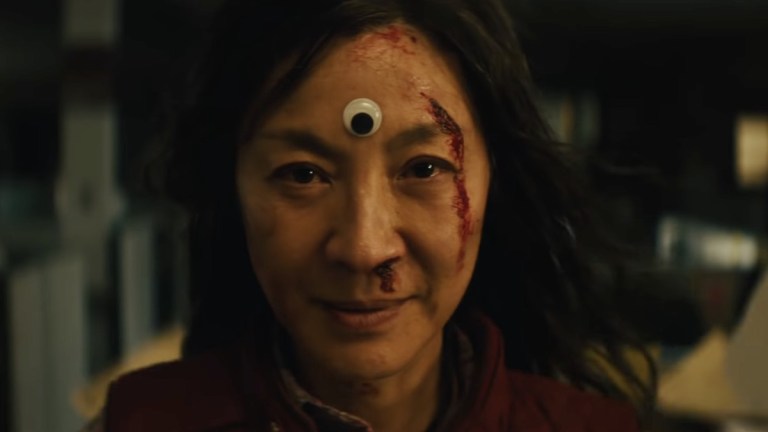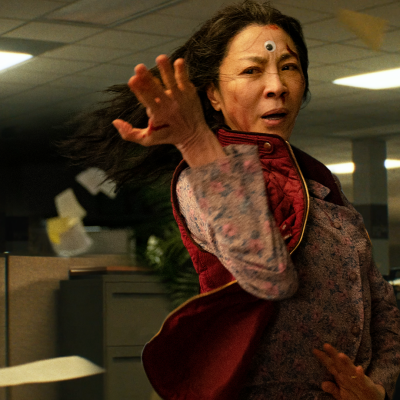Everything Everywhere Takes the Multiverse ‘Further Than It Should Go’
Exclusive: Filmmakers behind Everything Everywhere All at Once, including Michelle Yeoh and Jamie Lee Curtis, reveal why they took the multiverse to 11.

Michelle Yeoh wanted to meet the Daniels as soon as possible. Having just finished reading the script for the new and bizarre multiverse epic—a movie which initially named its universe-hopping heroine “Michelle Yeoh”—the actual Yeoh needed to see with her own eyes the writing-directing duo who could come up with something so intriguing (and perhaps a wee bit presumptuous).
When they finally sat face-to-face, according to the Everything Everywhere All at Once directors, Yeoh had one immediate question: What did you write?!
“I had no idea what the hell it was about,” Yeoh laughs now when we catch up at SXSW with her, the directing team of Dan Kwan and Daniel Scheinert, plus much of the Everything Everywhere cast, including Jamie Lee Curtis. Upon meeting them though, Yeoh came to two immediate conclusions: the Daniels are “evil geniuses,” which is to this day her affectionate nickname for them, and they had exactly what she looks for in a new project.
Says Yeoh, “For me, I have to know where the project is coming from and for two people to have written this insane script, I had to meet them to understand where’s the passion. Is there real passion or is it just a job?”
One conversation with Kwan and Scheinert alone lets you know that this is far more than just a job. Each filmmaker admits to having a strong affection for science fiction and out-there concepts. Their love for weirdness was of course already well-known thanks to their wild comedy Swiss Army Man, in which Daniel Radcliffe starred as a dead body being dragged around a coastline (think Weekend at Bernie’s except played kind of straight). But with Everything Everywhere All at Once, they reveal that evil genius side Yeoh talks about in the sci-fi form.
“We wanted to make something that felt so impossibly ambitious, and yet so playful that you can’t fault [the movie] for the chaos of it all,” says Kwan. “And I think we pulled it off in a really surprising way. I think we surprised ourselves, even, that it actually works on an emotional level.”
That emotional surprise is kept front and center by Yeoh throughout Everything Everywhere as the character Evelyn Wang (she insisted the character not be named “Michelle Yeoh”). Evelyn has spent the last 30 years working at the same laundromat with her husband Waymond (Ke Huy Quan), growing distant from him and estranged with her adult daughter Joy (Stephanie Hsu). That all changes when Waymond is possessed for the first of several times by one of his many variants throughout the multiverse. This one is a version of Waymond who has come to offer Evelyn the choice to live free—and face the threat of pernicious variants from other corners throughout the multiverse, including an even more ruthless version of her IRS auditor, Deirdre (Curtis), plus her own daughter, whose body is claimed by a version of Joy with vengeance on her mind.
The scope of the movie is enormous, with literally dozens of variations on these characters and our world being seen from every angle, including one universe where Evelyn and Deirdre have hot dogs for fingers. But there is something liberating in its cacophony of crazy.
“We did not make this thinking it would be released opposite like four other multiverse things,” Scheinert smiles while alluding to films like Spider-Man: No Way Home and the forthcoming Flash movie. Yet Scheinert fairly notes Everything Everywhere takes things much, much further.
“It’s fun to see our movie come out when people are familiar with the multiverse,” he continues. “I’m very excited to watch people get to react to ours, which is in some ways a critique of multiverse stuff and an exploration of it. But from the get-go, our idea was let’s take this further than it should go. Let’s break the movie with how much multiverse we can do.”
Collaborator Kwan more teasingly adds, “You can’t say the multiverse is infinite and not go to infinity. If there’s infinite multiverses, why go to just one? Even 10 is too little.”
As the film ratchets up its insanity, Scheinert promises that in some fast cutting montages you’ll see a different multiverse in every frame.
Yet the intimacy of it remains key to it carrying along the audiences who did dig it at the SXSW Film Festival world premiere. Yeoh, who is perhaps most famous in the West for movies like Crouching Tiger, Hidden Dragon and the James Bond picture, Tomorrow Never Dies, plus recent appearances in Shang-Chi and Crazy Rich Asians, likens it more to the Hong Kong action movies she first cut her teeth on during the 1980s and ‘90s.
“It reminded me in some ways of the Hong Kong cinema where everything’s thrown at you and you have no chance to understand what’s going on,” says Yeoh. “You just have to do it, do it! ‘Okay, now I’m doing it!’”
She calls it a big chaotic spectacle where her dear evil geniuses might even guffaw every time she falls while committing to the next martial arts stunt. But it’s also character-driven, and a chance to work with great character talent like the up-and-coming Hsu, who plays her daughter, and Quan, who had just come out of acting retirement. And then, of course, there’s also Curtis as the tax woman from hell. Not that Curtis would necessarily agree with that assessment.
“I think my job in any role I ever do is to just make sure I know who they are and love them,” Curtis tells us. “That’s my only job. I don’t judge her. I know her. And I know a lot of Deirdres. I know there are a lot of lonely people in the world who wield their jobs as a form of protection. It’s like they’re a superhero, and that desk they work behind—I think we’ve all been to the post office, I think we’ve all been to an IRS office—there’s a power in that role. And that’s who she is, that’s her superpower.”
In this way, Curtis suggests that her character might change the least when we see different shades and varieties of Deirdre throughout the multiverse. Yes, in some, the auditor wields a knife and runs at Yeoh, and in others she can relate to Evelyn on a personal, human level. But, as Curtis notes, “Deirdre is probably the least complicated in that switching because she lives in that fantasy life in her head all the time. You can’t—excuse my French—look at fucking bills all day long and not live in a fantasy life of your own.”
Yet the other performers get to be a bit more fractured in their portrayals. For Hsu’s part, she gets to play both Yeoh’s loving if put upon daughter and her arch-nemesis. But even as Jobu Tupaki, the woman with an apparent bloodlust against all multiverse variations on her mother, there’s something tangible for the performer to grab hold of.
“Everything is still about this family and these grounded characters in this one universe,” Hsu explains. “So when it splinters off into infinity, you have to have something to come home to.”
And for Quan—the former child actor who starred in generational touchstones like Indiana Jones and the Temple of Doom (1984) and The Goonies (1985) before retiring from acting due to a scarcity of good roles for Asian actors in Hollywood—it was the chance to show a variety of sides of his talent.
“For me, I haven’t done this in a while,” Quan says, acknowledging his last on-screen appearance was in 2002. “So when I got the part, one of the most challenging things was how do I play the same character with three different versions from the multiverse?” Luckily he had months of prep.
Says Quan, “I actually hired an acting coach, a voice coach because I wanted each version of Waymond to sound a little bit different and then, most importantly, I hired a body coach… So each version of Waymond would walk and talk differently.” He even developed different animals he would channel for each major version of his character: the “alpha” heroic Waymond was inspired by the eagle; the suave Waymond who partied with movie stars channeled the cunning of a fox; and the one our main Evelyn is married to? The man she followed from China to start a new life above a grimey laundromat? He was a squirrel.
“I watched a lot of hours on YouTube of just a squirrel moving around, eating,” Quan laughs. “And I printed out pictures of the squirrel and would literally tape them all over my wall. My wife wasn’t too happy just staring at those photos for a long time!”
Nevertheless, in the finished film it works. You can see Waymond assume one identity and then another in the same shot. And there remains a real connection and humanity between all the variants, even as the weirdness of Everything Everywhere is taken to 11. Even the already vaunted “hot dog hand” universe features a sincere empathy for Yeoh and even Curtis’ characters in that plane of existence.
“Michelle and I, our characters, have a real connection,” Curtis considers. “We connected as women, just the two of us, through those characters. We now have an intimacy that may be very small in the movie, but it was real. And I think that’s the beauty for me. In the midst of all this, there’s a beating heart, a beating lust for life.”
Everything Everywhere All at Once will be released by A24 nationwide on Friday, March 25.


